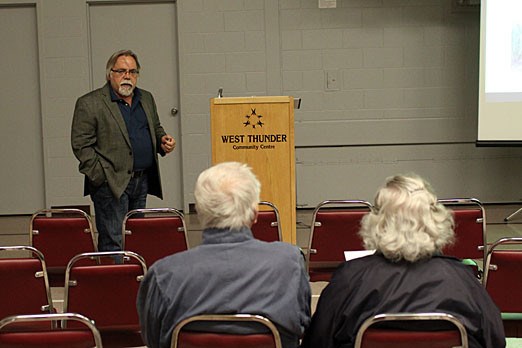With the demand for Ontario biomass increasing overseas, a spokesman for an energy workers’ union says they need to capitalize on the alternative energy source before the market becomes too big.
The Ontario Power Workers’ Union held a town hall meeting for Thunder Bay residents at the West Thunder Community Centre on Tuesday. The union wanted to discuss the benefits of converting Ontario’s coal-generation plants to a combination of carbon-neutral biomass and natural gas.
Officials with Power Workers’ Union have already made calls to about 60,000 homes in in Northern Ontario including Kenora, Fort Frances, Greenstone and Timmins.
The provincial government has also committed to phasing out coal plants by 2014.
Bob Menard, spokesman for the union, said they came to northern Ontario because they felt that the forestry industry could use materials to make woodchips that would be used at the biomass and natural gas stations.
He said that he’s been told there could be as much as 10 million tons of biomass available in all of Ontario.
But that might not matter too much if Ontario doesn’t capitalize on the opportunity, he said.
“It is important to remember that the biomass that we have currently is being contracted to go overseas to be used in European countries for the very reason we think it should be used here – to use it for electricity,” Menard said.
“There’s an export market starting and there’s a concern that it if it becomes too big then we won’t have the opportunity to take advantage of the fuel source here.”
The Thunder Bay Generating Station 310-megawatt coal plant along with other plants in the region will be making the transition soon making Northern Ontario the first region in the province to go coal-free.
The Thunder Bay coal plant has been in operation since 1963. It had an original capacity of 100 megawatts. By 1982 two more units were in place, each capable of generating 163 megawatts of electricity, allowing the original unit to be retired in 1984.
Northwestern Ontario's other coal-fired generating station, in Atikokan, is being converted to biomass as well and will be complete in 2013. The plant is expected to generate 150 million kilowatt-hours of renewable power, enough to power 15,000 homes each year.
He said having both processes available at a plant will help because if there are any problems with the supply of biomass the natural gas can still operate the plant and provide electricity.
“Turning wood products into wood pellets to burn in the plants would be extremely beneficial in terms of renewable power,” he said. “The independent study that was carried out to find out the volume of the biomass available identified easily two million tons of biomass. That would be sufficient to provide biomass to the southern Ontario plants. That’s northwestern and northeastern biomass being shipped to the south.”
He said studies have looked at the availability of forest products in Northern Ontario and identified enough materials that were not being used for softwood lumber and some materials that weren’t being used at all such as the wood waste products.
He added that most of the people they have spoken to are excited by the idea.
Fewer than 10 people showed up to the meeting on Tuesday but those who did told Tbnewswatch.com that they were in favour of having the plant converted.
Donna McCullough wanted to see Thunder Bay invest in cleaner energy ever since she moved back to the city to take care of her mother. One drive from southern Ontario, she said she saw fields of clear-cut wood and thought that it would be great if the province could turn that into something useful.
“I came here to see what this is all about,” McCullough said. “I’m here to find out more about biomass.”
One woman who did not want to give her name said she was in favour of converting the coal plant to biomass and natural gas because it could save taxpayers money in the long run.
But not everyone was in favour.
Gerald Landry said he’s had an interest in biomass for a long time and wasn’t sure if it was the right way to go. He said he had some concerns regarding possible health problems and wanted to learn more about biomass.
For more information people can go to the union’s website.
